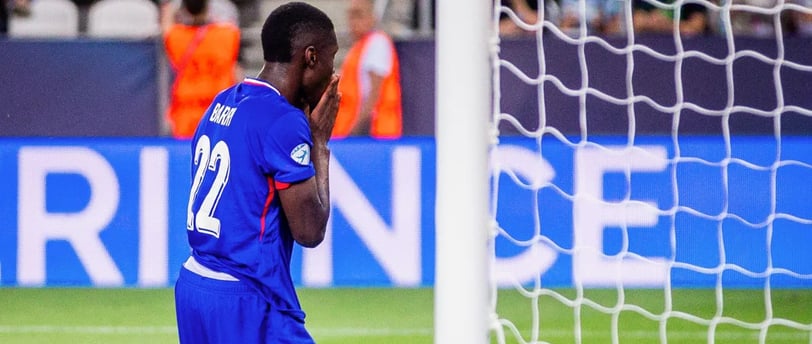Euro U21: France Espoirs Powerless Against Germany (0-3)
Debrief of the failed Euro U21 semi-final, with Baticle's analysis.
FOOTBALL
By Emmanuel louis
6/26/20257 min read


The Semi-Final Showdown
The Euro U21 semi-final match that unfolded in Košice represented a critical juncture in the tournament, showcasing intense competition between the French and German U21 teams. This encounter was particularly significant for France, who entered the match with high hopes of claiming the title, reflecting their strong performance throughout the tournament. The French U21 team, known for their blend of talent and resilience, had managed to progress through previous rounds with impressive victories, setting the stage for what was anticipated to be a thrilling showdown against their German counterparts.
Leading up to the semi-final, the French U21 squad had demonstrated their capabilities with a string of solid performances. They exhibited a mix of skilled ball control, tactical cohesion, and the ability to perform under pressure. Expectations were running high as fans remembered the team’s successes and potential, particularly given the rich history of French youth football. Their supporters arrived in full force at the stadium, eagerly anticipating a match filled with excitement and, hopefully, a pathway to the finals.
On the flip side, Germany’s U21 team also entered the match with its own rich pedigree, having demonstrated robust performances in the lead-up to this encounter. With a talent pool that rivaled that of France, the German squad was equally determined to assert its dominance in European U21 football. This match served as a poignant reminder of the intense rivalry that exists between the two nations at every level of the sport, often characterized by tight contests and memorable moments.
Early Errors: A Critical Blow
The match between France's U21 team and Germany was marred by critical defensive errors that significantly altered the course of the game. Within the first fourteen minutes, the French defense was responsible for several lapses that allowed Germany to establish a commanding lead. The opening goal came as a result of a basic defensive oversight, where a miscommunication between the central defender and the goalkeeper led to an unchecked striker capitalizing on the mistake, slotting the ball home with ease. This early setback not only put France on the back foot but also sent a ripple effect through the team's morale.
The second goal followed closely, stemming from another defensive blunder exacerbated by the mounting pressure and the need to recover from the initial mistake. This goal illustrated a clear lack of composure in the backline, where players appeared hesitant and unsure of their roles. Consequently, the French team struggled to regain their composure after these early errors, affecting their overall game strategy. The rapid succession of goals left the players scrambling to adapt, stalling any attempts to build momentum in their own attack.
Analyzing France's Offensive Struggles
Throughout the Euro U21 match against Germany, France's efforts to establish an effective offense were consistently stifled by a solidly organized German defense. This match showcased the stark contrast in tactical execution between the two squads, with France struggling to mount any significant attacks. Key players such as Rayan Cherki and Arnaud Kalimuendo, touted for their potential and skill, found themselves frequently isolated and unable to create scoring opportunities. The lack of coherent movement off-the-ball further exacerbated their difficulties, leaving gaps in their attacking strategy.
The tactical approach employed by coach Sylvain Ripoll relied heavily on quick wide play and overlapping runs from the full-backs. However, throughout the match, these tactics were met with resolute resistance from the German backline, who adeptly closed down space and disrupted France's rhythm. In critical moments, when the French side did manage to advance into promising positions, their final ball lacked precision and cutting edge, leading to a series of missed opportunities. Notably, efforts from long-range shots failed to trouble the German goalkeeper and revealed a need for more direct gameplay.
Despite this frustration, there were a few standout moments where France came close to breaking the deadlock. A cross from the right wing found the head of Kalimuendo, whose effort drifted narrowly wide of the goalpost. Additionally, a well-executed counterattack saw Cherki cutting in from the left, only for his shot to be blocked by a tenacious defender. These moments served as reminders of what France could achieve, but ultimately underscored their offensive shortcomings in a match where they needed to capitalize on any openings against their opponents.
Germany's Tactical Superiority
During the recent Euro U21 match, Germany demonstrated a tactical approach that not only countered France's strategies but also highlighted their own strengths on the field. The German team's game plan was meticulously designed to neutralize the pressing style that France is known for, effectively rendering their high-tempo play less effective. The Germans employed a disciplined defensive formation that allowed them to maintain structural integrity, preventing France from breaking through on various occasions.
One of the key aspects of Germany's strategy was their ability to press intelligently. Rather than engaging in constant high pressing, they opted for a more calculated approach, ensuring that when they did press, it was executed comprehensively. This tactical adjustment allowed them to regain possession while simultaneously forcing France into hurried decisions, which often led to uncharacteristic errors. The precision of the German midfielders played a pivotal role, as they consistently intercepted passes and disrupted France's rhythm, showcasing the efficacy of their disciplined marking and spacing on the pitch.
Additionally, Germany's tactical superiority was evident in their ability to exploit France's defensive vulnerabilities. The German wingers frequently created space and leveraged the gaps left by the French full-backs, which resulted in effective wing play and ultimately led to crucial goals. Players like Florian Wirtz and Youssoufa Moukoko showcased exceptional skills, directly contributing to the scoreline with their strategic movement and incisive passes. Their involvement exemplified how Germany not only capitalized on weaknesses but also reinforced their status as a formidable opponent in the tournament.
In conclusion, Germany's match strategy rooted in tactical superiority not only countered France's strengths but also allowed them to play to their own advantages, ensuring a satisfying and decisive victory.
The Impact of Brahjan Gruda's Goal
Brahjan Gruda's late goal in the semi-final match between France Espoirs and Germany was pivotal in sealing the 3-0 victory for the German team. The timing of this goal, which arrived in the dying moments of the match, was particularly significant. From a psychological standpoint, a late goal can have a profound impact on the teams involved, and in this case, it was a major blow to the French players. As they struggled against their opponents, the knowledge that a victory was slipping away undoubtedly affected their morale and confidence.
This goal not only ensured Germany's place in the final but also served as a stark reminder of the challenges France faced throughout the match. Previous goals scored by Germany had already put France on the back foot, and Gruda’s strike reinforced their dominance. The psychological impact on the French squad cannot be overstated; they were already grappling with the pressures of a high-stakes game, and conceding a third goal punctuated the feelings of hopelessness and disappointment. Players may question their tactics, as well as their individual and collective performance, leading to significant introspection in the aftermath of the game.
On the other hand, Gruda's goal galvanized the German players, reinforcing their sense of accomplishment and boosting their team spirit. It served as a culmination of their strategy and execution throughout the match, demonstrating their ability to capitalize on opportunities, particularly in critical moments. Moreover, such a decisive victory will provide momentum as they prepare for the final, enhancing their confidence and belief in their capabilities.
Overall, Brahjan Gruda’s goal did more than just finalize the score; it encapsulated the emotional landscape of the match, influencing the trajectory of both teams as they navigate future challenges and opportunities in the tournament.
Post-Match Reflections from Gérald Baticle
Following the disappointing defeat of France’s U21 team against Germany, Gérald Baticle took the opportunity to reflect on the game and its implications for the future. In his post-match comments, he acknowledged the clear superiority of the German side, stating that they displayed a level of control and efficiency that France struggled to respond to. Baticle noted that the tactical execution of the German players was exemplary, and they effectively exploited the weaknesses within the French defense.
One of the critical aspects that Baticle highlighted was the lack of cohesion among his players. He mentioned that the team failed to establish their rhythm, which hindered their ability to create scoring opportunities. Baticle expressed that some key players did not perform to their potential, and this inconsistency was evident throughout the match. He remarked that while individual talent exists within the squad, collective effort is paramount in high-stakes encounters such as the one against Germany.
Furthermore, the coach discussed the importance of learning from such setbacks. He emphasized that each match serves as a valuable lesson in the development of the team, reminding his players that resilience and willingness to adapt are crucial in overcoming challenges in future competitions. Baticle encouraged a focus on mental fortitude and tactical discipline in training sessions moving forward, aiming to prevent a recurrence of the issues witnessed during the match.
In his closing remarks, Baticle reassured fans and stakeholders that the experience gained from this defeat would contribute significantly to the growth of the squad. Such introspection is essential in the long-term aspiration of reclaiming the prowess of French football at the youth level and beyond.
Looking Ahead: The Future of France U21
The recent defeat of the France U21 team against Germany serves as a pivotal moment for the future trajectory of French football at the youth level. While the 0-3 scoreline highlights areas of concern, it also presents an opportunity for reflection and growth. As the national team seeks to rebound from this setback, several significant changes and developments are necessary to enhance the performance of the U21 squad moving forward.
One of the primary areas that requires attention is talent identification and development. France is renowned for producing exceptional players who have gone on to achieve remarkable success, but the current U21 team must tap into this depth more effectively. Coaches and scouts should pay close attention to standout performers in lower-tier leagues and grassroots football. Emerging talents such as midfield playmaker Lucien Moreau and forward Theo Découvrez could play critical roles in revitalizing the squad, bringing fresh energy and innovative skills to the setup.
Additionally, fostering a cohesive team culture is essential as younger players step into significant roles. Building resilience, a strong work ethic, and collaborative spirit will be crucial as the U21s navigate the next competitive trials. The emphasis should be equally on tactical acumen and mental fortitude, enabling the players to rise to the occasion when facing formidable opponents.
Moreover, the broader implications for French football suggest that robust investment in youth development programs will be vital. Creating an environment where young talents can flourish ensures not only the improvement of the U21 squad but also the long-term success of the national team. It is important for the French football federation to review its strategies comprehensively, aiming for a harmonious integration of skill development and competitive experience.
In essence, while the defeat against Germany was disappointing, it offers a chance to reevaluate and strengthen the foundations of French football. By focusing on youth development and adaptability, the future of the France U21 team holds promise for not just recovery but significant success in forthcoming tournaments.
